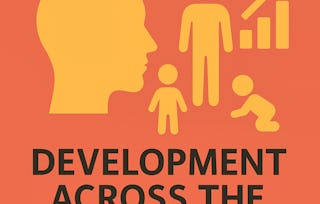人性本質的開端是善或惡?成長與改變的原因是源自遺傳或環境?人類發展的過程是如小樹苗漸成大樹般的量變、還是如毛毛蟲變成蝴蝶般的質變?這些哲學爭辯顯示了同一個發展現象背後可能有不同的立場,因而需以縱貫追蹤或橫跨不同世代的跨齡研究設計探討人類發展的本質。此外,發展心理學欲瞭解的對象往往包括無法聽從研究者指示、或無法以語言、文字充分表達自己的嬰幼兒與兒童,因此需以特殊的研究派典才能回答發展趨勢、發展歷程是否為連續、以及個別差異是否隨發展保持穩定等議題。因此,本課程的主旨有二,一為說明各種看待發展的哲學觀、另一則為介紹發展心理學的研究設計與方法。

發展心理學:哲學觀與方法論 (Developmental Psychology: Philosophical Bases and Methodology)

發展心理學:哲學觀與方法論 (Developmental Psychology: Philosophical Bases and Methodology)

Instructor: 雷庚玲
11,256 already enrolled
Included with
92 reviews
Skills you'll gain
Details to know

Add to your LinkedIn profile
See how employees at top companies are mastering in-demand skills

There are 4 modules in this course
發展心理學所涵蓋的研究領域及關心的年齡層包括哪些?本模組將介紹「發展」的意義以及發展心理學家所關心的發展議題,並將以「人生到處知何似,應似飛鴻踏雪泥,泥上偶然留指爪,鴻飛那復計東西」說明發展心理學家研究「發生」、「發展」、及「改變」的規則的重要性。
What's included
6 videos2 readings
人類發展到底源自先天、還是後天?本模組的第一部份將從「個體發生的初始狀態」及「個體發展的動力由何而來」兩個議題介紹先天與後天的哲學爭論。除將介紹西方哲學與宗教的思潮對個體發展的不同看法之外,也介紹中國古代的訓蒙典籍中對先天與後天的看法。最後則舉例說明單一的發展心理學理論如何可在「初始狀態」、「發展動力」兩個議題上分別嵌入先天、後天的不同假說。 人類發展的一般趨勢中,到底是被動地、機械性地累積經驗;還是隨著人類基因藍圖所鋪序的成熟過程而主動整合並創造經驗?本模組的第二部份將介紹「視發展為逐步累積的量變」的連續觀、與「視發展為個體主動整合經驗而產生質變」的不連續觀。此外,個體發展難免有個別差異,有些差異會隨著發展而穩定存在、有些差異則隨發展而有所更動。本模組將介紹先天與後天因素如何可分別及共同影響個別差異的發展穩定性。並解釋關鍵期/敏感期與個別差異穩定性的關聯。
What's included
6 videos2 readings1 assignment1 discussion prompt
對發生的初始狀態、發展的動力、發展的一般趨勢、或個別差異的穩定性等哲學假設,都需要靠實徵資料才得以檢驗。然而,未成年的嬰幼兒或兒童往往無法聽從研究者的指示而做反應,也無法以語言、文字充分表達自己看得見或聽得見什麼,喜歡或偏好什麼,更別說表達自己的行為與態度有何特性。因此發展心理學家設計了不同的研究派典,以便能精準捕捉嬰幼兒與兒童的知覺、認知、語言、及社會情緒的歷程。
What's included
5 videos1 assignment1 peer review
想要探討「發展的趨勢連續與否」、「發展的個別差異穩定與否」的議題,甚或只是想描繪「不同年齡的發展里程碑」,勢必都需要取得跨越不同年齡的資料。但要如何設計研究與招募不同年齡的參與者才不致使跨年齡的資料受到世代差異與測試時間差異的污染,就需要透過特殊的發展研究設計才能解決了。本模組將介紹「縱貫追蹤設計」、「橫斷設計」、「序列設計」三種方法,及其優點與缺點。 此外,本模組也將介紹為了捕捉特定行為或概念如何逐步改變的「短時序設計」。最後,本課程也將簡介對未成年族群進行研究的特殊倫理考量。
What's included
5 videos1 reading1 assignment1 discussion prompt
Instructor

Offered by
Explore more from Psychology
 Status: Preview
Status: PreviewO.P. Jindal Global University
 Status: Free
Status: FreeUtrecht University
 Status: Free Trial
Status: Free Trial Status: Free Trial
Status: Free Trial
Why people choose Coursera for their career

Felipe M.

Jennifer J.

Larry W.

Chaitanya A.
Learner reviews
- 5 stars
77.17%
- 4 stars
16.30%
- 3 stars
2.17%
- 2 stars
2.17%
- 1 star
2.17%
Showing 3 of 92
Reviewed on May 28, 2022
课程帮我理解了长大后的一些性格原因是怎样在幼儿时期形成的,了解了一些实验设计方法,对小白来说,很受用,谢谢老师
Reviewed on Jun 1, 2023
感谢帮我评估作业的同学TT我终于通关了这门课蛮有启发意义的,但是我还想提一些小建议如果讲方法论的时候可以结合现有的文献融合讲解应该会更帮助大家理解和应用,单讲比如说时间法研究有些难以实践

Open new doors with Coursera Plus
Unlimited access to 10,000+ world-class courses, hands-on projects, and job-ready certificate programs - all included in your subscription
Advance your career with an online degree
Earn a degree from world-class universities - 100% online
Join over 3,400 global companies that choose Coursera for Business
Upskill your employees to excel in the digital economy
Frequently asked questions
To access the course materials, assignments and to earn a Certificate, you will need to purchase the Certificate experience when you enroll in a course. You can try a Free Trial instead, or apply for Financial Aid. The course may offer 'Full Course, No Certificate' instead. This option lets you see all course materials, submit required assessments, and get a final grade. This also means that you will not be able to purchase a Certificate experience.
When you purchase a Certificate you get access to all course materials, including graded assignments. Upon completing the course, your electronic Certificate will be added to your Accomplishments page - from there, you can print your Certificate or add it to your LinkedIn profile.
Yes. In select learning programs, you can apply for financial aid or a scholarship if you can’t afford the enrollment fee. If fin aid or scholarship is available for your learning program selection, you’ll find a link to apply on the description page.
More questions
Financial aid available,
¹ Some assignments in this course are AI-graded. For these assignments, your data will be used in accordance with Coursera's Privacy Notice.

